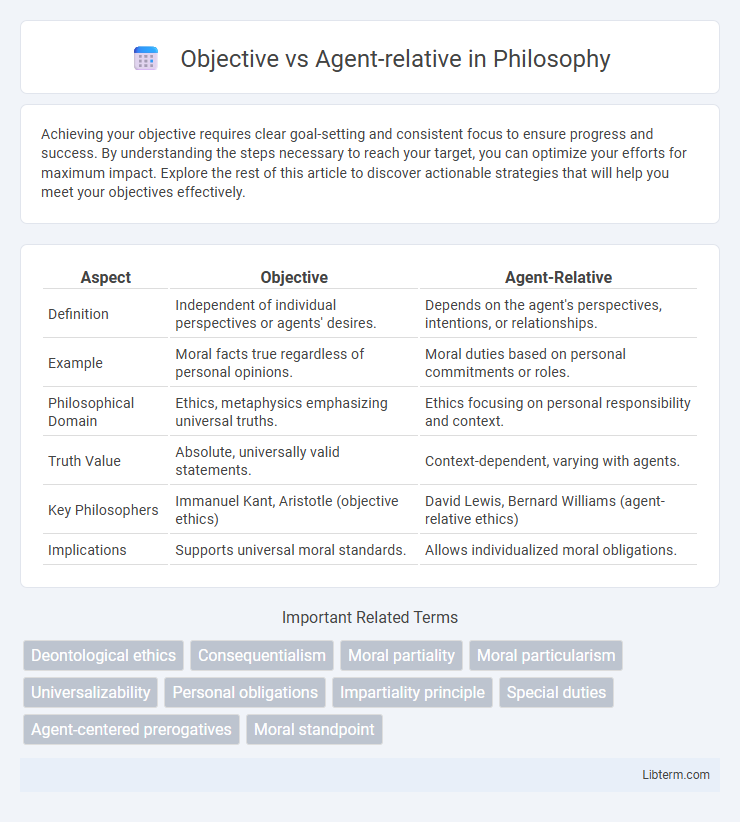Achieving your objective requires clear goal-setting and consistent focus to ensure progress and success. By understanding the steps necessary to reach your target, you can optimize your efforts for maximum impact. Explore the rest of this article to discover actionable strategies that will help you meet your objectives effectively.
Table of Comparison
| Aspect | Objective | Agent-Relative |
|---|---|---|
| Definition | Independent of individual perspectives or agents' desires. | Depends on the agent's perspectives, intentions, or relationships. |
| Example | Moral facts true regardless of personal opinions. | Moral duties based on personal commitments or roles. |
| Philosophical Domain | Ethics, metaphysics emphasizing universal truths. | Ethics focusing on personal responsibility and context. |
| Truth Value | Absolute, universally valid statements. | Context-dependent, varying with agents. |
| Key Philosophers | Immanuel Kant, Aristotle (objective ethics) | David Lewis, Bernard Williams (agent-relative ethics) |
| Implications | Supports universal moral standards. | Allows individualized moral obligations. |
Understanding Objective and Agent-relative Concepts
Objective concepts are understood as universally valid and independent of individual perspectives, grounded in facts and external reality. Agent-relative concepts depend on an individual's specific viewpoint, intentions, or roles, reflecting subjective considerations tied to personal or social contexts. Differentiating these concepts is crucial for analyzing ethical frameworks, decision-making processes, and philosophical arguments related to responsibility and value attribution.
Defining Objective Morality
Objective morality refers to ethical principles that exist independently of individual beliefs or cultural perspectives, asserting that certain actions are universally right or wrong. Agent-relative morality, by contrast, grounds moral judgments in the specific standpoint, motives, or relationships of the moral agent, allowing for personal or situational variation. Defining objective morality hinges on the claim that moral truths are fixed and binding for all agents regardless of personal interests or social contexts.
Exploring Agent-relative Perspectives
Agent-relative perspectives prioritize the subjective reasons and motivations tied to individual agents, contrasting with objective views that rely on impersonal, universally applicable principles. This approach highlights how moral judgments and decision-making processes vary depending on an agent's particular circumstances and relational context. Emphasizing agent-relative reasons reveals the complexity of ethical evaluation, where personal commitments and identities play a crucial role in shaping moral obligations.
Key Differences Between Objective and Agent-relative Ethics
Objective ethics emphasize universal moral truths that apply consistently regardless of individual perspectives, focusing on impartiality and external standards. Agent-relative ethics prioritize the moral agent's personal commitments and relationships, allowing for ethical duties that vary based on individual contexts and roles. Key differences lie in the scope of moral principles, with objective ethics promoting universal impartiality and agent-relative ethics endorsing context-dependent obligations.
Philosophical Foundations of Objectivity
Objective truth refers to facts and principles that hold independently of individual perspectives, grounded in universal validity and commonly accepted standards. Agent-relative judgments depend on an individual's particular reasons, intentions, or interests, reflecting subjective or context-dependent considerations. The philosophical foundations of objectivity emphasize the necessity of detaching knowledge claims from personal biases to establish shared, reliable truths across diverse agents.
The Role of Agency in Moral Decisions
The role of agency in moral decisions distinguishes objective ethics, which rely on universal principles, from agent-relative ethics that emphasize the individual's intentions and commitments. Agent-relative theories prioritize personal relationships, motives, and contextual factors in determining moral obligations, highlighting the agent's perspective. This approach acknowledges the significance of agency by recognizing that moral duties can vary depending on the individual's standpoint and specific contexts.
Practical Implications of Objective vs Agent-relative Views
Objective views promote universal moral standards that guide consistent ethical decision-making across diverse contexts, enhancing fairness and predictability in societal norms. Agent-relative views emphasize individual perspectives and situational factors, allowing personalized judgments that can better accommodate unique relationships and responsibilities. This distinction impacts legal frameworks, medical ethics, and interpersonal obligations, influencing how rules are applied and moral accountability is assigned.
Debates and Challenges in Moral Philosophy
Debates surrounding objective versus agent-relative moral values center on whether ethics are universally binding or dependent on individual perspectives, raising challenges in defining moral objectivity. Critics argue that objective morality struggles to account for cultural and personal differences, while agent-relative theories face difficulties in establishing consistent ethical standards. This tension highlights fundamental issues in moral philosophy, including the grounding of moral duties and the conflict between impartiality and personal commitments.
Objective and Agent-relative in Real-world Scenarios
Objective ethics evaluate moral actions based on universal principles independent of individual perspectives, ensuring consistency in real-world scenarios such as legal judgments and human rights enforcement. Agent-relative ethics prioritize the intentions and relationships of the acting individual, influencing personal decisions like caregiving or professional responsibilities. Balancing these approaches enables coherent moral assessments in complex social contexts where both universal rules and personal commitments play crucial roles.
Conclusion: Balancing Objectivity and Agency
Balancing objectivity and agency requires recognizing that moral judgments can incorporate both universal ethical principles and individual perspectives rooted in personal values or social roles. Objective standards provide a consistent framework for evaluating actions across contexts, while agent-relative considerations account for the unique intentions, commitments, and circumstances influencing decision-making. Integrating these approaches fosters a more nuanced ethical analysis that respects impartiality without disregarding personal agency.
Objective Infographic

 libterm.com
libterm.com